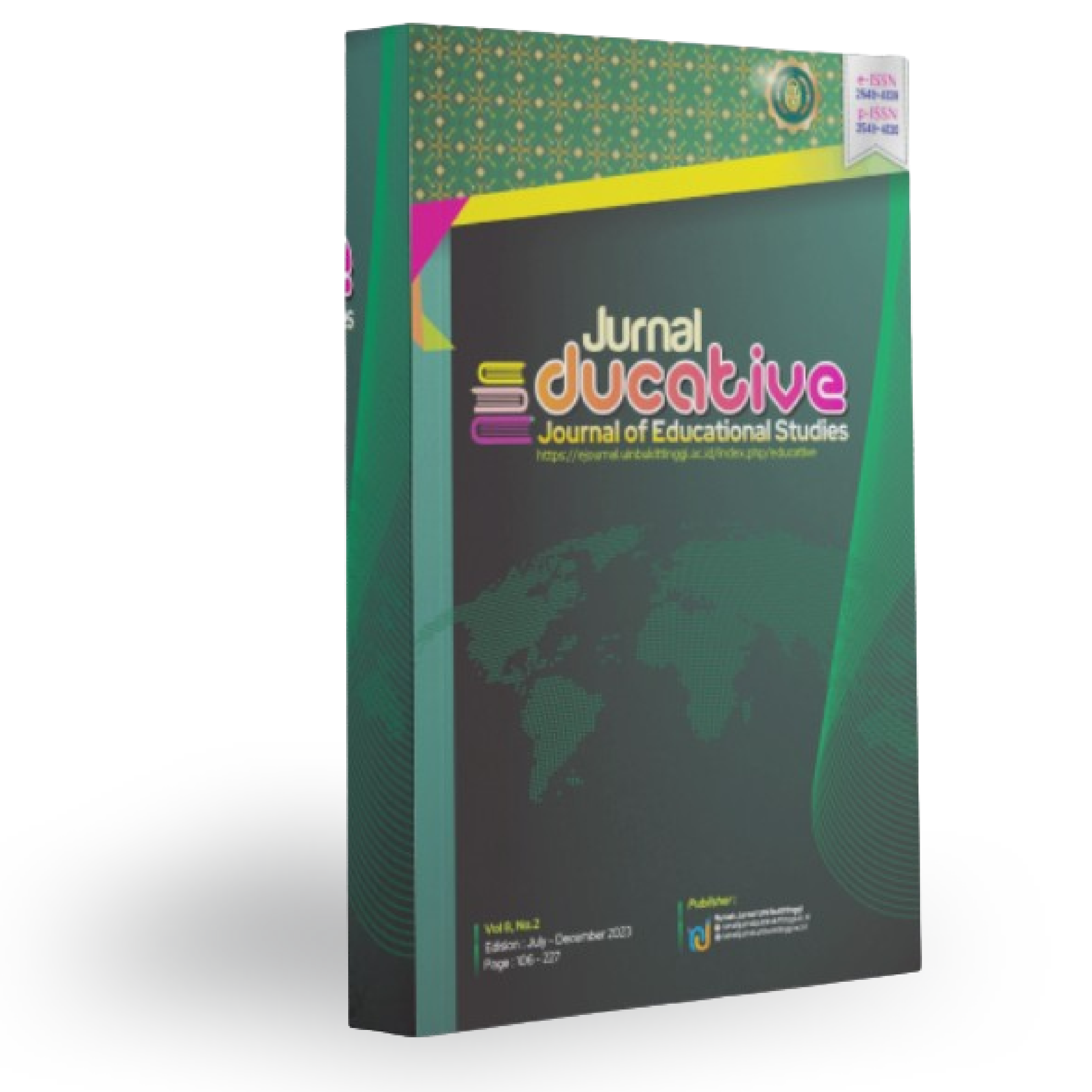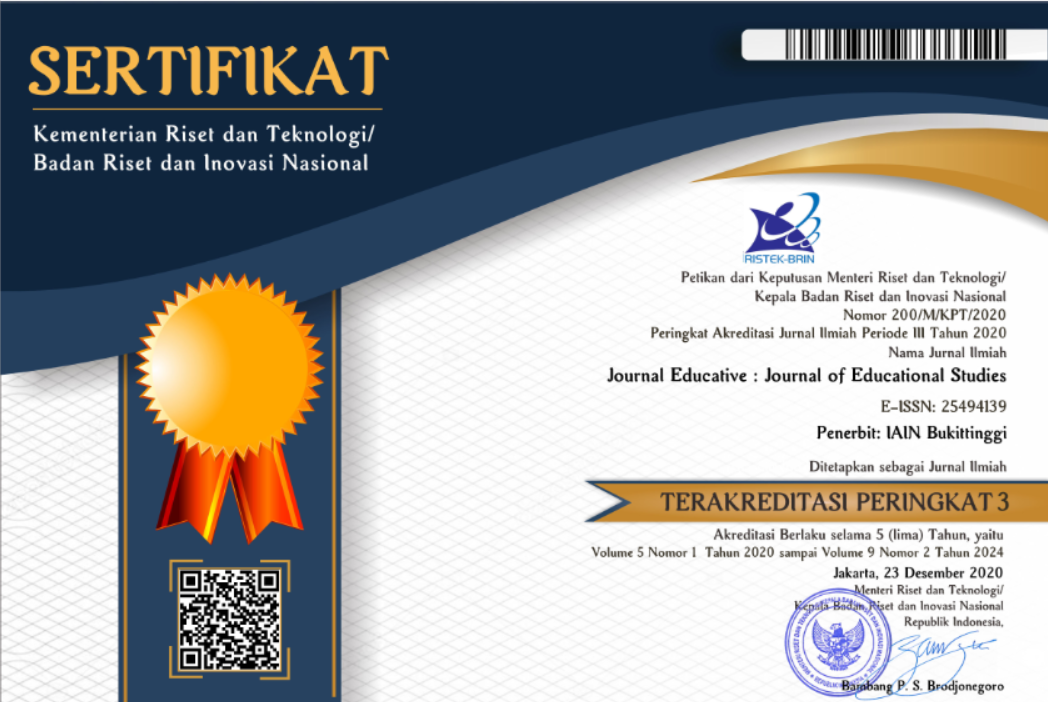ADDITIONAL MENU
About the Journal

Focus and Scope
Jurnal Educative: Journal of Educational Studies publishes original articles on the latest issues and trends occurring internationally in curriculum, instruction, learning, policy and preparation of teachers with the aim to advance our knowledge of education theory and practice.
In addition to original articles, the journal features the following special sections:
- Critical Perspectives in Education : composed of empirical research, conceptual arguments, or reviews that focus on learning, pedagogies, cirricula, or initiatives that explicitly question or challenge the dominant goals and aims of the field. This may include macro- (e.g., policy) or ground-level (e.g., classrooms, out-of-school, community settings) considerations of: sociopolitical contexts of oppression, their intersections, anti-oppressive directions, and/or alternative possibilities as they pertain to education.
- Learning : consisting of theoretical and empirical research studies on learning. We invite manuscripts that investigate learning and its change and growth from various lenses, including psychological, social, cognitive, sociohistorical, and affective. Studies examining the relationship of learning to teaching, the knowledge and practices, the learners themselves, and the contexts (social, political, physical, ideological, institutional, epistemological, and cultural) are similarly welcome.
- Issues and Trends : consisting primarily of analytical, interpretive, or persuasive essays on current educational, social, or philosophical issues and trends relevant to the teaching. This special section particularly seeks to promote informed dialogues about current issues in education, and carefully reasoned papers representing disparate viewpoints are welcomed. Manuscripts submitted for this section may be in the form of a position paper, a polemical piece, or a creative commentary.
- Education Policy : including reports about the goals and/or underlying principles of policies adopted by government, interest groups, school districts, etc., and their effect on teaching and learning. Additionally, research on education policy relates to a critical examination of how theory, research, and practice of education are influenced by policy decisions.
- Learning in Everyday Life : consisting of analytical, interpretative, or philosophical papers regarding learning outside of the formal classroom. Papers should investigate experiences in settings such as community, home, the Internet, after school settings, museums, and other opportunities that develop science interest, knowledge or practices across the life span. Attention to issues and factors relating to equity in learning are especially encouraged.
- Teacher Education : consisting of original empirical and/or theoretical research that examines the preparation of teachers, the work of teachers, or how teachers' work is influenced by a broader context. "Teacher education" refers to development throughout the continuum of one™s teaching career, from pre-service, through induction, into advanced professional stages of teaching.
Peer Review Process
Some policies in reviewing process of Jurnal Educative: Journal of Educational Studies
- All manuscripts submitted to this journal must follow Focus and Scope and Author Guidelines of this journal. The submitted manuscripts must fulfil scientific merit or novelty appropriate to the focus and scope of this journal.
- All manuscrips submitted to this journal must be written in good English or indonesian. Authors for whom English or Indonesian is not their native language are encouraged to have their paper checked before submission for grammar and clarity. The work must not have been published or submitted for publication elsewhere.
- The submitted manuscripts to this journal will be peer-reviewed at least 2 (two) or more expert reviewers from International Peer-Reviewers. The reviewers give scientific valuable comments improving the contents of the manuscript. Sometimes (if required) a third peer-reviewer is needed to give critical comments to the submitted manuscript. The review process used in this journal is double blind review system.
- All submitted manuscripts must be free from plagiarism contents. All authors are suggested to use plagiarism detection softaware to do the similarity checking (please use Turnitin to check the similarity). Editors will also check the similarity of manuscripts in this journal by using a Turnitin software
- Final decision of manuscript acceptance is solely made by Editor in Chief (together with Associate Editors and Editorial Board if required for consideration) according to reviewers critical comments. The final decision of manuscript is solely based on the Associate Editor and Editorial Board final review which considering peer-reviewers comments (but not solely by Reviewer).
- Publication of accepted articles including the assigning the article to published issue will be made by Editor in Chief by considering sequence of accepted date and geographical distribution of authors as well as thematic issue.
All articles published Open Access will be immediately and permanently free for everyone to read and download. We are continuously working with our author communities to select the best choice of license options, currently being defined for this journal as follows: Creative Commons Attribution-Share Alike 4.0 International (CC BY-SA 4.0)
Publication Frequency
Jurnal Educative: Journal of Educational Studies is published twice a year in the months of June and December.
Open Access Policy
This journal provides immediate open access to its content on the principle that making research freely available to the public supports a greater global exchange of knowledge.
This journal is open access journal which means that all content is freely available without charge to users or / institution. Users are allowed to read, download, copy, distribute, print, search, or link to full text articles in this journal without asking prior permission from the publisher or author. This is in accordance with Budapest Open Access Initiative.

 CC BY-SA 4.0
CC BY-SA 4.0 

